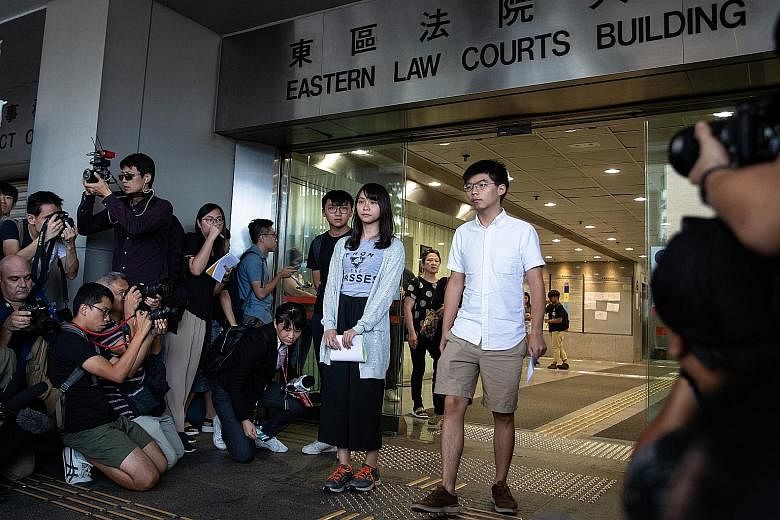HONG KONG • The arrests on Friday of prominent pro-democracy lawmakers and activists in Hong Kong reflect a tactical escalation by China's leaders to curb the recent street violence, but which could prolong the protests for many months.
The authorities in Beijing, along with the Hong Kong government that answers to them, have decided on a policy of stepped-up arrests of demonstrators, who would be publicly labelled the most radical of the activists, according to Hong Kong Cabinet members and leaders of the local pro-Beijing establishment.
These local political figures emphasised that China wants the Hong Kong police to carry out the arrests - not Chinese soldiers, whose intervention in the city's affairs would be unprecedented.
Beijing has also ruled out making concessions to the demonstrators, they said. With protest leaders also vowing not to back down, officials acknowledged the price of the strategy could be months of acrimony.
"I hope we can start the process of reconciliation before the end of the year," Mr Ronny Tong, a member of Hong Kong's Executive Council, or Cabinet, said in an interview.
Beijing and Hong Kong officials are betting that the protests will gradually die down as the police detain the most hardline demonstrators, and that public opinion will turn more decisively against the use of violence, said Professor Lau Siukai, a long-time adviser to the Chinese government on Hong Kong policy.
The Hong Kong police said on Friday that they had arrested more than 900 people this summer in connection with the protests.

The police, who have been accused by demonstrators and international rights groups of using excessive force, have "not used their capacity to suppress the protests" until very recently, said Prof Lau, who ran the city's policy planning agency for a decade until 2012.
With broad backing from mainland China, "the mood of the police was lifted up and they became even more ferocious in putting down the protests", said Prof Lau, who is now vice-chairman of the Chinese Association of Hong Kong and Macau Studies, a semi-official advisory body set up by Beijing.
With Chinese President Xi Jinping dealing with a trade war with the United States, a strategy of attrition in Hong Kong could be seen as preferable to a rash approach that might risk spiralling into a major crisis.
But it is far from clear how much success the authorities will have.
The handful of pro-democracy activists and lawmakers who were arrested on Friday have relatively moderate reputations.
Demonstrators have contended that at least some of the violence attributed to them may have been instigated by undercover police agents.
Protesters also suspect the authorities of involvement in a spate of attacks on pro-democracy activists by men armed with sticks, baseball bats and even meat cleavers.
Similar incidents in Hong Kong over the years have been linked to organised crime groups, which have a history of ties to Beijing.
The mutual distrust has become so great that not only are the authorities and pro-democracy activists not holding talks, but the informal contacts that once existed between the government and the older generation of activists - who, themselves, are mistrusted by many of the younger protesters - have also essentially come to a halt.
Each side has worried that any effort to quietly negotiate a deal would be torpedoed by leaks, embarrassing anyone who might try to strike a compromise. From the government's point of view, those fears were realised when Mrs Carrie Lam, the Chief Executive, met local young people this past week, only for a recording to be leaked to Apple Daily, a pro-democracy outlet.
The Chinese military's police conducted large exercises just across the border from Hong Kong last month as a show of force. But those exercises were aimed at showing that China is prepared for any contingency, and were not a preamble to any plan for actual deployment in Hong Kong, Prof Lau and others familiar with the exercises said.
Mr Martin Lee, a veteran pro-democracy campaigner and founder of the Hong Kong Democratic Party, said that Beijing did not want anything to mar its Oct 1 celebration of the 70th anniversary of the founding of the People's Republic of China.
Beijing "won't allow bloodshed to happen in Hong Kong before then - after Oct 1, beginning on the 2nd, I don't know," Mr Lee said.










